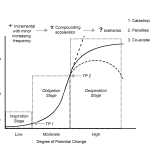ESG - THE BASICS
WHAT TO SAY AND WHAT NOT TO SAY
A legal onslaught awaits false claims of Carbon Neutral and Net Zero, so maybe take our advice?

Along with ESG reporting obligations comes an increasing risk of prosecution on the grounds of green-washing or social-washing. There are already cases being filed in the UK and USA against companies that have made ‘Net Zero’ or ‘Carbon Neutral’ claims, so we strongly advise avoiding these terms.
If you have any doubt whatsoever about your claims we strongly recommend seeking legal advice. There are a variety of risks that you should consider when communicating your ESG credentials:
Greenwashing: Some organisations or individuals may claim to be ‘Net Zero’ or ‘Carbon Neutral’ without implementing substantial changes or taking real action to reduce emissions. This can mislead the public into thinking meaningful progress is being made when it is not and are grounds for prosecution.
Offsetting reliance: ‘Net Zero’ or ‘Carbon Neutral’ targets often rely on offsetting emissions through activities like tree planting or buying carbon credits. While offsets can play a role, relying too heavily on them without reducing emissions at the source may not address the root problem effectively. At worse this can be a public relations problem and could possibly form the grounds for prosecution.
Technological uncertainties: Achieving ‘Net Zero’ or ‘Carbon Neutral’ often requires the deployment of new and unproven technologies, such as carbon capture and storage. The effectiveness and scalability of these technologies are still being tested, which poses risks in meeting ambitious carbon goals and should therefore we recommend exercising caution when making any claims.
Social and environmental justice: The transition to ‘Net Zero’ or ‘Carbon Neutral’ could unintentionally exacerbate social and environmental inequalities. For example, certain communities may bear disproportionate burdens due to the location of renewable energy projects or the extraction of resources required for clean technologies. So, we recommend that when making claims about carbon reduction, that you also link them to verifiable social benefits.
Lack of transparency: The lack of standardised definitions and reporting frameworks for ‘Net Zero’ or ‘Carbon Neutral’ can make it difficult to assess the credibility and comparability of different claims. This lack of transparency may undermine trust and hinder progress in the overall transition to a sustainable future.
Are there any marketing opportunities for ESG information? Is greenwashing a risk? Yes, your ESG information can be an excellent and powerful way to differentiate your products and services if done openly and honestly, and in partnership with your value chain. But you must be careful to not overstate what you are doing which can lead to accusations of green-washing and social-washing.
It is important to approach ‘Net Zero’ or ‘Carbon Neutral’ commitments with caution, ensuring they are backed by comprehensive plans, transparent reporting, emission reductions at the source, and a focus on social and environmental justice. It is for these reasons that we recommend using the following terms interchangeably or in conjunction with each other, highlighting the shared goal of reducing carbon emissions and mitigating climate change:
- Low-Carbon: Indicating activities or practices that cause or result in only a relatively small net release of CO2 emissions into the atmosphere.
- Low-Emission: Indicating activities or practices that cause or result in reduced GHG emissions into the atmosphere.
- Carbon-Light: Describing processes, technologies, or lifestyles that have minimized GHG emissions or have a lower carbon footprint compared to conventional alternatives.
- Decarbonised: Referring to processes, industries, or energy sources that have undergone a significant reduction in carbon emissions or have transitioned to carbon-free alternatives.
- Greenhouse Gas-Reducing: Describing measures or initiatives aimed at lowering emissions of greenhouse gases.
- Climate-Friendly: Signifying actions, technologies, or practices that have a positive impact on the climate by reducing or mitigating GHG emissions.




